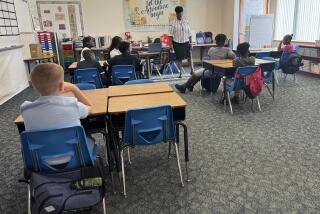HUNTINGTON BEACH : Parents Are Fighting to Keep School
As the recess bell sounds, the playground at Golden View Elementary School fills with children laughing, bouncing balls and skipping rope. One boy, however, clings to a chain-link fence, peering out.
His gaze is fixed on a group of chickens trotting aimlessly about a school farm. He stares unflinchingly for several minutes.
“He’s one of our Down’s syndrome kids,” Principal Mike Merz said. “Those kids have a particular affinity for this place.”
Golden View was the first school in the Ocean View School District to accept severely handicapped children and has since developed the district’s most comprehensive special-education program. The school farm is the only one of its kind in the district.
Parents and teachers say that because of such programs, their school is unique and irreplaceable.
But because of shrinking enrollment, Golden View is one of three schools the district is considering closing.
Built in 1972 as one of the experimental “open structure” schools, Golden View has changed dramatically from its early days, when the curriculum was unstructured, no grades were handed out and students were not pushed to progress beyond the level at which they felt comfortable. Those practices, which proved ineffective, have long since been abandoned for a more traditional routine.
But the school’s bent toward bold educational programs and strong parental support, as well as its singular architecture, remain intact.
Golden View is still a school without permanent walls or hallways. Its 18 classrooms, divided only by partitions, are arranged in a circular fashion around a nucleus that includes an extensive library and amphitheater-like multipurpose room.
The library, with its 11,000 books, is among the district’s largest. The school uses the multipurpose room for a number of activities, including its “Meet the Masters” arts program, sponsored by the South Coast Repertory theater, and for biweekly meetings Merz holds with the children “to talk about whatever’s on their minds,” he said.
In addition to the 2 1/2-acre farm, the school also has an aviary filled with exotic birds and a play village, in which older students tutor younger ones by acting as merchants in the miniature town.
Lottie Hobbs lives outside Golden View’s enrollment boundaries, but her children attend there because she was impressed with its programs.
“I like the open-space feature because I think it promotes a sense of community, social responsibility and communication among teachers and children that you don’t find at other schools,” she said. “The kids get a good feeling of being part of a group, that they are part of the school as a whole. And I like the advantages of that.”
In order to support the school’s unusual array of programs, Golden View has always been particularly dependent on parent volunteers, some of whom work there daily.
The farm, for example, is almost entirely reliant on the parents’ help, Merz said. The district employs a part-time farmhand, and the school’s janitor spends part of his day tending to the farm. But parents and students raise all the money needed for feed through recycling drives and handle all maintenance during the summer months. One father, a carpenter by trade, is building a new chicken coop.
Consequently, that community of parents has banded together to fight to keep the school open. An estimated 200 Golden View parents turned out for a recent school-closure hearing, and some of them are organizing a letter-writing campaign.
Many of the neighborhood trees are adorned with red ribbons--the school’s colors are red and gold--and scattered houses in the vicinity now display “Save Golden View School” banners.
Scott Miller, chairman of the committee recommending the school closures and a parent of four Ocean View students, agrees that Golden View is “probably one of the best schools in the district.”
But because the school is located within half a mile of Hope View School, which has a similar enrollment shortage, one of them has to go, he said.
“Golden View is beautiful as it is,” Miller said. “But would it be if we had another 200 kids? And, as a district with the kinds of financial problems we have, can we afford a school like Golden View, with all its wonderful programs? And if we offer those things for one school, shouldn’t we offer them at every school?”
More to Read
Sign up for Essential California
The most important California stories and recommendations in your inbox every morning.
You may occasionally receive promotional content from the Los Angeles Times.









